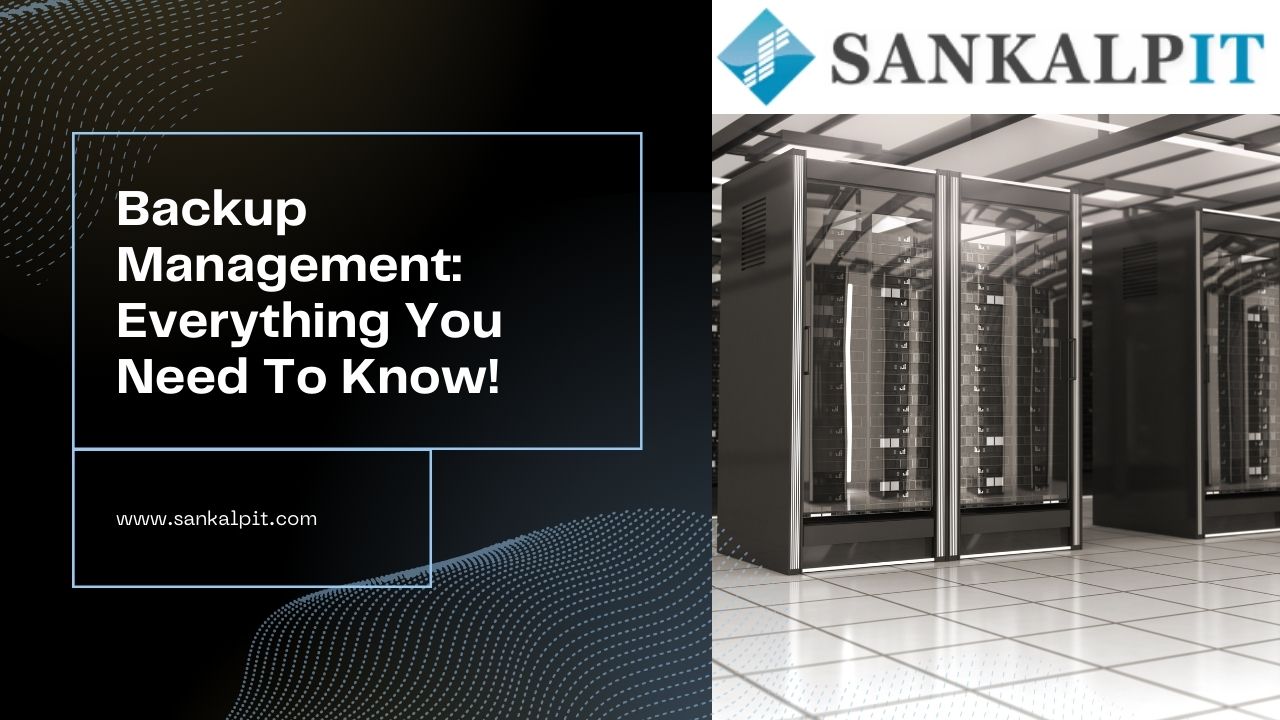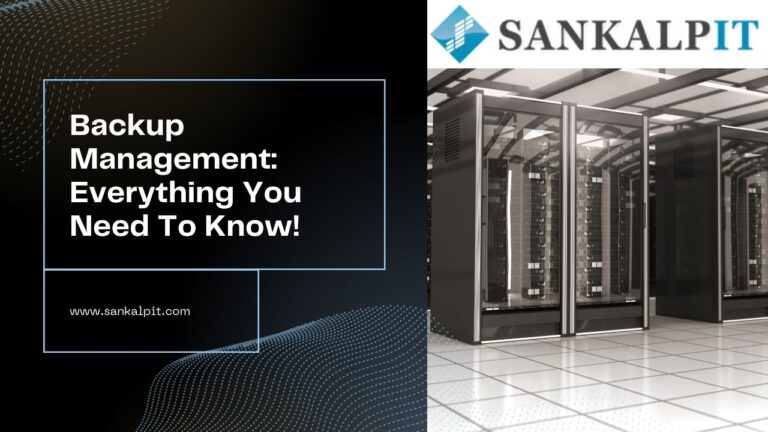Backup Management : Everything You Need To Know!
- June 1, 2025
- Blog
- 0



Data failure is definitely one of the worst nightmares, if not the worst nightmare a company could ever face. We are always at the risk of chronic data losses and an organization that does not know how to thwart these threats will unquestionably be the most vulnerable to it.
You know the situation is dire when the best case scenario is that you lose a day or two worth of work and important information, and the worst case scenario is something you don’t even want to consider.
Scary, right ?
Here comes in the role of data backup and backup management. It is a process through which companies can protect their useful records against unforeseen losses and data crashes. In order to ensure its safety in case of software, hardware or man-made failures, a copy of the original data is prepared and stored in a separate location from the primary data
This is data backup, not to be confused with data backup management.
The system of backing up and managing data is not a new one. It is just as old as data itself. We understood the need to secure important information a long time ago, and we have come a long way from creating hand written copies of data in the past to backing up whole systems through technological and software advancements.
In this age of information, where information rules everything, there is no doubt that keeping your personal data secure is a top priority, same goes for companies and businesses.
If you’re new to backup management and wondering how it works, or even if you’re well experienced with it, we have complied a detailed guide to walk you through the whole process. After this, you will be well acquainted with how it works, all the nuances and you’ll be able to get started on your own or choose an ideal backup management service for yourself.
Before diving into it, it must be noted that backup management is a lengthy process and not just limited to a few steps. Even after this system is established, it needs to be constantly examined so that any anomaly in data backup may be resolved at the earliest instance of identification.
Even though it is not a relatively meek procedure, this makes it all the more important for any organization. You cannot hope to advance ahead unless you have a reliable structure of backup management to safeguard extremely important and sensitive information.
Now that you know what you are getting yourself into…
…Let’s get started!!
Data is created, received or shared every second of the day. This makes it imperative for an organization to put an effective and efficient data backup management system in place.
Here is everything you need to do in order to get a backup management system up and running…
1. Compilation of all databases to be backed up-
The first and foremost task to be done is the accumulation of any and every form of data, belonging to the organization, which has to be backed up. This data might be in the form of organizational documentation, reports, tickets, spreadsheets and anything else.
Pre-accumulation of all data instead of improvising the step saves a lot of time and manual energy.
2. Backup creation and storage of all the accumulated data-
The backups thus created, are stored in a separate medium from the original source of data. These may be external mediums like different hardware (and Different location )or stored on the same hardware through different software.
Storing backups on different hardware is considered to be the most preferred mode of backup storage as it protects the data against any form of hardware failure which contains the original data. If the original data and backups are stored at the same physical location, they are always vulnerable to the risks of losing both the original data as well as the backup at the same time.
3. Regular backup recovery testing drills–
Once backup has been completed, the task is not finished here. The backups need to be tested first and it has to be made sure that the recovery works smoothly.
Regularly testing the backup is an important part of backup management as it helps in verifying that the backup system is functioning effortlessly, that the backed up data is identical to the original one and there are no instances of data or backup failure.
It also makes sure that all the backups are important and valid and if any backup is found to be obsolete, it can be deleted.
4. Accurate backup reports-
Detailed or summarized backup reports provide an insight on the previous and ongoing backup processes. This helps in charting the backed up data and the upcoming backups that require completion.
It is an excellent method of remaining at speed with all the backup functions of the business without going through any excessive trouble.
This is how a backup management system works.
Seems like a long and time consuming process, doesn’t it?
It is!!
If only we had someone to take care of all the data backup so that we would not have to spend our time on it…
We do have someone!!
Backup Management Service Providers do all the gruelling backup tasks that a business does not want to spend its precious time on.
It is no secret that setting up a synchronized and well-structured backup system in place is a long arduous process and spending a lot of time on such an instrumental set up is not something that a functioning business would yearn for.
The need to save time, labour and financial resources is a prerequisite for any organization hiring a backup management service.
Such a service takes care of all the backup related tasks and issues which start from data backup but are not limited to data recovery only.
Hence, it is safe to say that a backup management service will take charge of all the tasks it is delivered with, while the business hiring them can go about their daily works and do not have to worry about any form of data loss.
THE IDEAL BACKUP MANAGEMENT SERVICE
An ideal backup management service will have a unique strategy of backup management customized according to the needs of their clients.
All clients and their needs are different…
…and a good service provider understands this and works accordingly to achieve the maximum and best possible results.
They strategize their plan of action and lay out the structure of backup that would be the best suited to the organizational and IT system of the business hiring them.
Time is money!
A flourishing business knows that time is the greatest and scarcest resource at their disposal. Hence, it is only natural to delegate tasks that are sure to consume a lot of company time.
The reports also contain in-depth material on current backups. Backups that have expired, obsolete backups or any backup which is incompatible with the backup management system.
However the truth is on the contrary!
Backup management services provide great value for money!
How do they do that?
The backup management services already have their whole backup system in place and because they can host multiple clients at once they can afford to provide backup resources at feasible prices to their clients.
This would indisputably be lesser of an expense than investing in a backup system which after its setup regularly needs to be monitored hence incurring heavy financial exhaustion.
You might also need to hire and train staff for backup management whereas a backup management service already has ready to work trained professionals in all fields who can work according to you and your business’s personal needs.
Therefore, investing in hiring a backup management service is the safer and economical option of the two.HOW TO
If you have decided to opt for a service of backup management, consider that you have already taken a step in the right direction.
Firstly, you have to identify the kind of service that you’re looking for.
Then, categorize and enlist all the databases you want to backup.
According to the information gathered as above, shortlist all the backup management services that are compatible with your IT structure and organization.
Once you have taken a pick, just get in touch with the service and lo and behold!! Its done!
After that, all you have to do is to let the backup management service work their magic, at minimal fees, and without any need for administrative interference from your side.
Now that you know the high and low of backup management services. We hope that you feel a lot better and confident in making this ultimate decision. A decision that affects not only your data and recovery coordination but also the way your business functions.